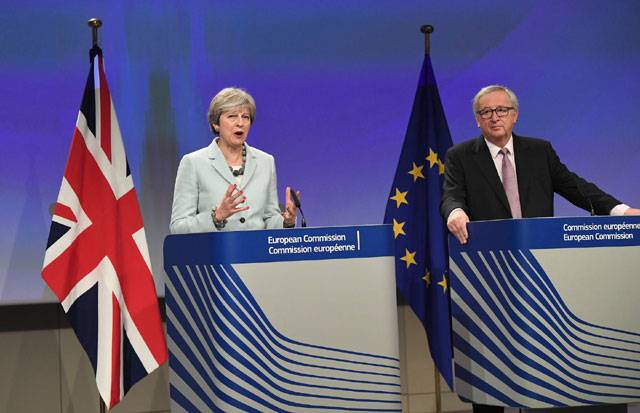BRUSSELS - Britain and the European Union reached a historic deal on Brexit divorce terms on Friday that allows them to open up talks on a future relationship after the split.
Prime Minister Theresa May rushed to Brussels for early morning talks with European Commission President Jean-Claude Juncker to reach the breakthrough.
The European Commission announced that it “recommends sufficient progress” had been made by Britain on separation issues including the Irish border, Britain’s divorce bill, and citizens’ rights.
But EU President Donald Tusk - who will recommend to leaders at a summit next week to open trade and transition talks - warned that the toughest task was to come. “Let us remember that the most difficult challenge is still ahead. We all know that breaking up is hard but breaking up and building a new relation is much harder,” Tusk said. Negotiators worked through the night to seal an agreement after the EU set a deadline of Sunday. May said the key part of the agreement was to ensure there would be no return of checkpoints on the frontier between British-ruled Northern Ireland and EU member Ireland after Britain leaves on March 29, 2019.
“In Northern Ireland we will guarantee there will be no hard border,” she told a press conference with Juncker.
Northern Irish unionists who prop up May’s minority Conservative government scuppered a possible deal on Monday with their fierce opposition to wording they felt would divide the North from the rest of the UK.
Britain will pay a financial settlement of between £35 billion-£39 billion (40-45 billion euros, $47-52 billion) for leaving the European Union, Prime Minister Theresa May’s spokesman said on Friday.
After striking a deal in Brussels, British officials said the figure would include regular payments into the EU budget until 2020, promised contributions still left to be paid out and payment for the pensions of EU officials.
Arlene Foster, leader of the pro-British DUP party, told Sky News she was “pleased” to see changes to the deal following their demands. The deal commits both sides to respect the 1998 Good Friday agreement, which ended decades of violence between nationalists who want a united Ireland and Northern Ireland unionists loyal to Britain.
Under the agreement, London will find a way to avoid a hard border on the island of Ireland “through the overall EU-UK relationship” but if this cannot be achieved, Britain will keep “full alignment” with the EU single market and customs union rules that are crucial to the Good Friday Agreement.
Irish Prime Minister Leo Varadkar welcomed the deal as “the end of the beginning”, saying his government had “achieved all that we set out to achieve” and warning they would remain “vigilant” in upcoming negotiations.
On its divorce bill, previously the most contentious issue, Britain agreed to pay a settlement amounting to between 45 billion and 55 billion euros.
Concerning the welfare and social rights of some three million European citizens living in the UK after Brexit, as part of the deal Britain agreed to protect them with a mechanism to give EU citizens recourse to the EU’s top court if they feel they are being treated unfairly.
Tusk however warned that there was “de facto less than a year” for trade talks as it has taken a year and a half since Britain’s June 2016 Brexit referendum to settle divorce terms.
The former Polish premier, who deals with EU leaders, released nine draft guidelines on future relations so member states could approve them for next week’s summit.
He said he would propose the “immediate” opening of talks on a transition period, which Britain has estimated at around two years, but warned Britain would have to “respect the whole of EU law, including new law” during that period.
That is likely to be a red line for pro-Brexit members of May’s Conservative party.
Tusk said London must also respect budgetary commitments and judicial oversight during the transition period - in which the remaining 27 European Union states will carry on meeting and making decisions without Britain having a say.
Britain will also have to collect EU customs tariffs and ensure all EU checks are performed on borders with third countries, according to a copy of the nine draft guidelines obtained by AFP.
Tusk called for more clarity from Britain on what kind of trade relationship it wants, but the bloc’s chief Brexit negotiator Michel Barnier said London had left little room for manoeuvre.
He told a press conference that Britain’s insistence on leaving the single market and customs union left the EU with no choice but to work on a post-Brexit free trade agreement modelled on the bloc’s deal with Canada.
“It’s not us, it’s our British friends who are giving these red lines which close certain doors,” Barnier said.
The run-up to the deal had caused fevered speculation, with Juncker’s chief of staff Martin Selmayr finally tweeting a picture of white smoke - the sign used by the Vatican to signify the election of a new pope - after May’s arrival.






